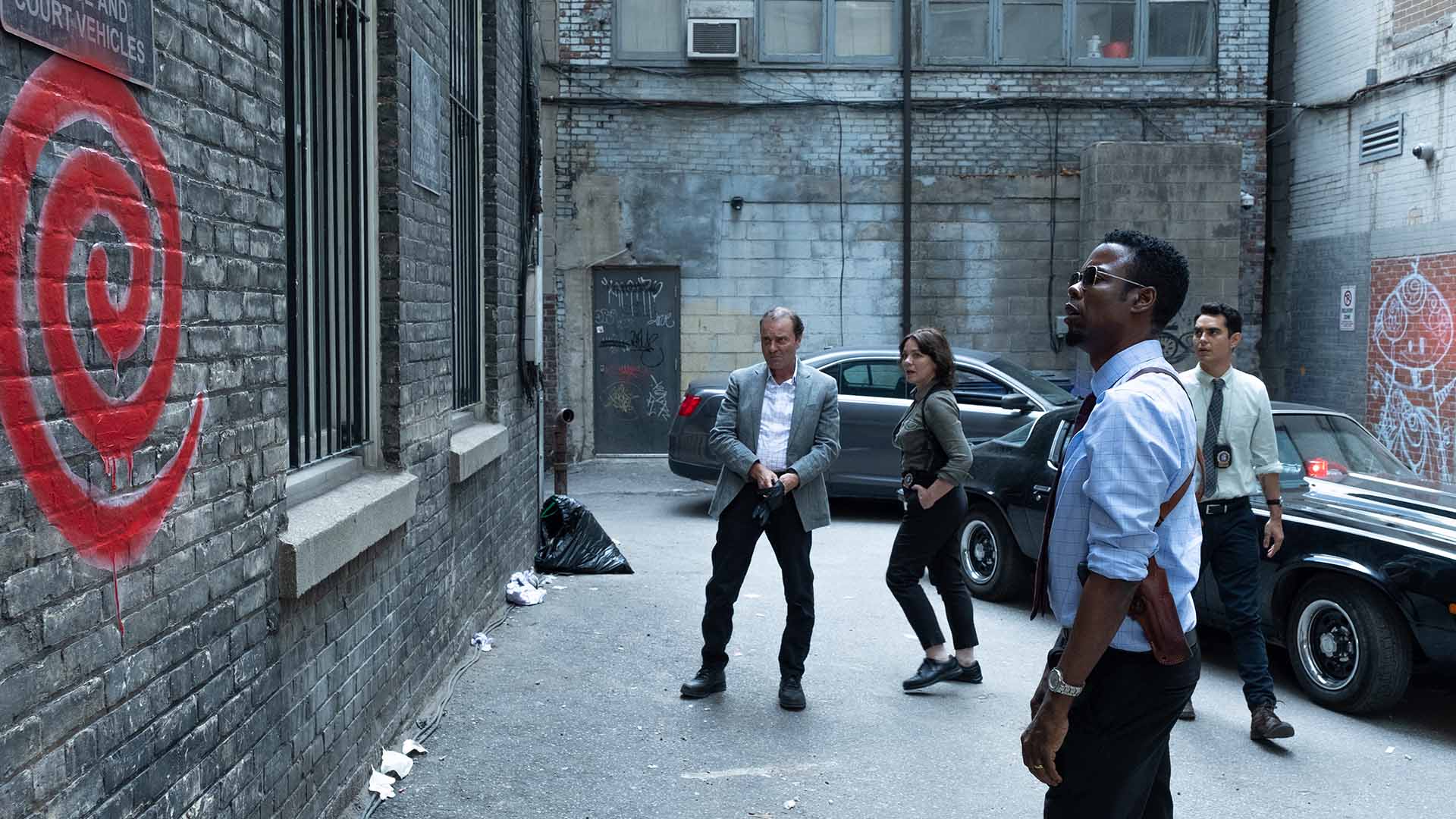Spiral: From the Book of Saw
It might star Chris Rock and Samuel L Jackson, but the latest 'Saw' film is as derivative as you'd expect of the ninth instalment in the horror franchise.
Overview
With Spiral: From the Book of Saw, what came first: the decision to call its protagonist Ezekiel, or the casting of Samuel L Jackson as said character's father? Either way, the film's creative team must've felt mighty pleased with themselves; getting the Pulp Fiction actor to utter the name that's been synonymous with his bible-quoting, Quentin Tarantino-penned monologue for more than a quarter-century doesn't happen by accident. What now four-time franchise director Darren Lynn Bousman (Saw II, Saw III and Saw IV) and Jigsaw screenwriters Josh Stolberg and Pete Goldfinger mightn't have realised, though, is just how clumsily this choice comes across. The Saw series has made almost a billion dollars at the worldwide box office, but now it's resorting to winking and nodding to one of its latest stars' past movies. Perhaps Bousman and company didn't notice because almost everything about Spiral feels that forced, awkward, clunky and badly thought-out. Jackson and Chris Rock might gift the long-running franchise a couple of high-profile new faces; however, this ostensible reboot is exactly as derivative as you'd expect of the ninth instalment in a 17-year-old shock- and gore-driven saga.
Focusing on a wisecracking, gung-ho, about-to-be-divorced police detective known for exposing his dirty colleagues, Spiral tries to coil the series in a different direction, at least superficially — and pretends to have meaty matters on its mind. Ezekiel 'Zeke' Banks (Rock, The Witches) has been crusading for honesty, integrity, fairness and honour in law enforcement for years. Starting back when his now-retired dad Marcus (Jackson, Death to 2020) was the precinct's chief, he's been vilified by his peers for his efforts. When a killer appears to be targeting rotten cops, too, Zeke is desperate to lead the case. Initially, he just wants to avenge the death of the first victim, one of the only co-workers he called a friend, but he's soon trying to track down a murderer that seems to be following in franchise villain Jigsaw's footsteps. A lone wolf-type not by choice but necessity, Banks also happens to be saddled with a rookie partner (Max Minghella, The Handmaid's Tale) as he attempts to stop the bodies from piling up.
Even if Spiral had reached screens in May last year as was initially intended pre-pandemic, it would've arrived in a social, cultural and political climate that has been rightly taking a stand against police brutality. The film doesn't have much to say about the topic, however. Recycling the usual cop movie tropes — corruption is endemic, a select few battle against it, but the bad routinely outmuscles the good — it uses the subject as nothing more than a gimmick. Forget weight, depth, nuance or resonance. Spiral just wants a reason for its killer to keep offing cops within its grimy, dankly lit, often jittery fames, and for Zeke to have almost zero backup. Like the pig's heads used by its new agony-inflicting maniac, the end result is bloody yet empty. It smacks of trying to dress up a well-worn idea in fresh packaging, but then only making a half-hearted attempt that relies upon on another genre's conventions. Indeed, the police procedural format, the cast, the topical themes, the 70s thriller look and the focus on a different murderer are all part of a big bait-and-switch act; they might lure viewers in, but a torture porn flick that's rarely even standard is sadly the only thing that awaits.
The deaths, which are largely seen in flashbacks devoid of any tension, are characteristically nasty and gruesome. Covering severed tongues, ripped-off appendages, flayed carcasses and drowning via hot wax, they're designed to get the squeamish to avert their eyes again and again. But testing the audience's threshold for blood, guts, gore and complicated torture devices isn't the same as engaging them. Nor is combining the series' brand of gratuitous one-upmanship and supposed lessons with Seven-esque box deliveries and the kind of by-the-numbers serial killer taunting that wouldn't have even made the first draft of any David Fincher project. Spiral doesn't just do the bare minimum in its purported attempt to tackle problematic cops, but demonstrates the same contentedness to merely tick boxes with the franchise's grisly staples, too. A word to the easily nauseated: the film's panic-inducing traps and macabre dismemberments aren't pleasant, which is wholly in keeping with the template set up by Australians James Wan (Aquaman) and Leigh Whannell (The Invisible Man) back in 2004's first movie, but it's hard to be put off by something that's this dully formulaic.
Perhaps driven by a dream to wake up on-screen chained to a pipe — with a saw within reach, of course — Rock instigated his own involvement in Spiral. A big fan of the series, and of horror movies in general, he came up with the idea for the feature's detective storyline as well. While he's the best thing about the film, he also often feels as if he's mixing his stand-up routines with his far-superior performance in last year's fourth season of Fargo. Yes, with both Jackson and Rock alike, Spiral just can't stop reminding its viewers that its talents both have better projects to their names. Don't go expecting much of their collaboration here, either, with the picture pairing them up sparingly and leaving the audience wanting more — which is the only instance where that statement proves true throughout the entire movie. When the film abruptly comes to an end, it unsurprisingly sets up its next chapter, but it certainly hasn't earned anyone's continued investment. And, in case you'd missed how little it cares for its police brutality narrative, it chooses to end with an image so cliched that it makes the hackneyed dialogue about playing games and the clues delivered on USB drives seem positively fresh in comparison.





